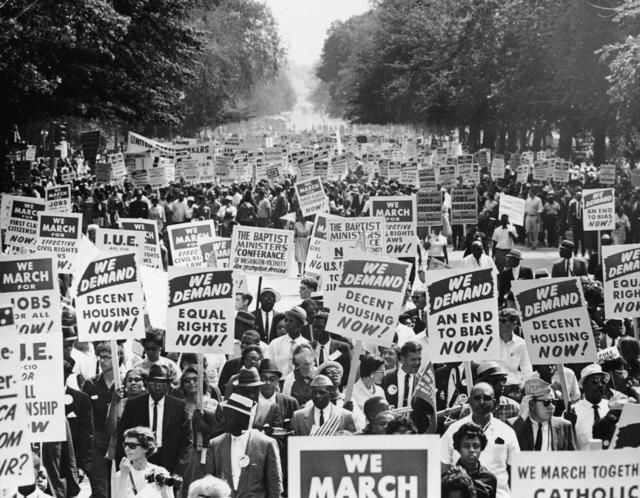

Credit: CBS


The march also linked the struggle for racial equality with economic justice, especially decent paying jobs for Black communities. The United Auto Workers had a visible presence at the march.
This massive outpouring occurred months after Birmingham, Alabama’s notorious, fascistic Public Safety Commissioner, Bull Connor, unleashed vicious police dogs and ordered firefighters to turn on their fire hoses on a May 3, 1963, march of hundreds of Black school children.


Credit: CBS
The historic march happened one month before the horrific bombing of the 16th Street Baptist Church by the Ku Klux Klan, also in Birmingham — aka “Bombingham” — that killed four young Black girls during their Bible study.
While the Washington march is mainly famous for Dr. Martin Luther King Jr.’s iconic “I have a dream” speech, then President John F. Kennedy attempted to sabotage the event with his behind-the-scenes violence-baiting of the march. In June of 1963, Kennedy met with six prominent civil rights leaders, including Dr. King, hoping to convince them to cancel the march. Fortunately, he did not succeed.
The LGBTQ2S+ question loomed large over whether the march would take place due to the pivotal role played by Civil Rights leader Bayard Rustin. Rustin was a conscientious objector as a Quaker during World War II, and he was gay. Some of the march organizers expressed concern that if Rustin’s antiwar stance and especially his sexual orientation became public, it would hurt the outcome of the march. But due to the principled support of the Black labor leader A. Philip Randolph and Dr. King, Rustin maintained his prominent organizing role.
There were other little known but important behind-the-scenes issues, including the lack of leadership roles for Black women activists. That would not happen today.
However, despite these internal and external political issues, this historic march became an important milestone in helping to advance the legal struggle for bourgeois democratic rights for Black people that began post-Civil War and continued post-Reconstruction.
And that struggle continues today in various forms, from Black Lives Matter to the just demand for reparations.
Download the PDF Black and white version All out for May Day! Students defend pro-Palestine…
By Jonas, Mutual Aid Scientific Socialism To the workers and free peoples of the world: We…
Houston Mumia’s supporters gathered in Houston’s historic Emancipation Park on April 27, not just to…
El Partido Mundo Obrero (PMO/WWP) saluda el 50 aniversario de la impresionante victoria de la…
Spain’s Prime Minister Pedro Sanchez cancelled a multimillion-dollar arms deal recently to buy munitions from…
Buenos Aires, April 15, 2025 Katz is an economist, researcher at the National Scientific and…